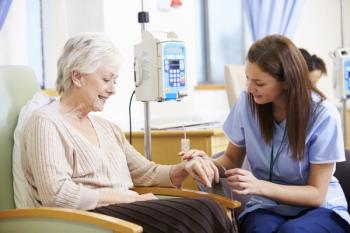
Liz Stokes, PhD, JD, RN, director of the Center for Ethics and Human Rights, discusses the nurse’s role in medical aid in dying and common misconceptions.

Liz Stokes, PhD, JD, RN, director of the Center for Ethics and Human Rights, discusses the nurse’s role in medical aid in dying and common misconceptions.

Conversations surrounding fertility preservation may differ between young men and women with cancer, according to Donna Herrera Bell, MSN, APRN, FNP-C.

Oncology nurses at the 2022 ASTCT Meeting shared how a peer-to-peer observation and validation tool helped decrease central line-associated bloodstream infections by 68%.

A nurse-led intervention demonstrated initial success in connecting patients to scalp cooling therapy and reducing the impact of alopecia.

Cognitive therapies were found to be effective for helping cancer survivors with insomnia, but more research is needed for patients actively receiving treatment.

The death doula is a unique role that can help oncology care teams improve the quality of end-of-life care delivered to patients.

A patient-friendly stoplight tool with 3 different colored zones helped patients undergoing chemotherapy manage diarrhea and reduce hospital and emergency department visits.

Patients who receive medical cannabis in addition to standard opioids may require less overall opioid treatment to manage their pain.

Very low dose radiation therapy was found to be an effective treatment approach in the palliative setting for patients with indolent non-Hodgkin lymphoma.

Oncology nurses are in less control of their communication environment compared with other health care providers; however, certain strategies can help them communicate effectively with their patients.

The most important thing that an oncology nurse can do to help a patient navigate their sexual health is repeatedly offer them permission to have conversations surrounding their health.

In this episode of “The Vitals,” Heidi Donovan, PhD, RN, discusses novel symptom management intervention for women with recurrent ovarian cancer.

New data demonstrate that regular exercise can help patients with breast cancer mitigate the physical and mental treatment–related side effects that might impact their quality of life.

Caitlin Benda, MBA, MS, RD, CSO, LDN, a clinical oncology nutritionist supervisor at American Oncology Network, comments on different ways oncology nurses can assist patients in reaching their overall caloric intake.

The disparate use in telemedicine between White and Black patients warrants further exploration into compound cases, such as economic and societal factors.

Childhood cancer survivors may benefit from high-risk obstetric care despite being able to conceive and give birth safely.

As prognoses continue to improve, concerns about treatment-associated fertility risks are becoming more prevalent and are often a topic of discussion between patients and their nurses or nurse practitioners.

In this episode of “The Vitals,” Caitlin Benda, MBA, MS, RD, CSO, LDN, discusses important dietary considerations for patients with cancer.

Lindsay Kroener, MD, offers an overview of current fertility preservation options for patients about to undergo cancer therapy.

At a presentation during the 39th Annual Miami Breast Cancer Conference, Lindsay Kroener, MD, highlighted key components related to fertility preservation for patients with breast cancer.

Emerging from the HazeTM, a cognitive rehabilitation program, is a combination of didactic and experiential content focused on brain health to provide participants with a toolbox of strategies to help them cope with cancer treatment-related cognitive impairment.

In this episode of “The Vitals,” Matt Iwaniec, PsyD, discusses the value of integrated behavioral health programs in cancer care.

An expert with Allegheny Health Network discusses the value of behavioral therapy and how access and stigma often play a role in preventing patients from receiving this form of care.

A licensed clinical health psychologist with Allegheny Health Network discusses fully integrated behavioral health programs and how their design alleviates potential barriers to care that patients may experience.

With nearly two-thirds of the states allowing for medical cannabis use and the legalization of hemp, accessing cannabinoids has become much easier— especially for patients with cancer.

A nurse-driven palliative care referral intervention demonstrated preliminary success in increasing the number of patients who received this form of supportive care.

Experts from Roswell Park developed a dosing guide for the prescription of buprenorphine as treatment for chronic pain.

Janice Post-White, PhD, RN, FAAN, an oncology nurse and caregiver, comments on how the act of writing allowed her to process previously suppressed emotions.

Although e-cigarettes are often marketed as a “safe alternative,” non-smokers should understand that smoking still poses risks of lung damage, explains an expert with CTCA.

In this episode of “The Vitals,” Dr. Janice Post-White discusses how she balanced working as an oncology nurse through her child’s cancer diagnosis, and the lessons she learned from the experience.